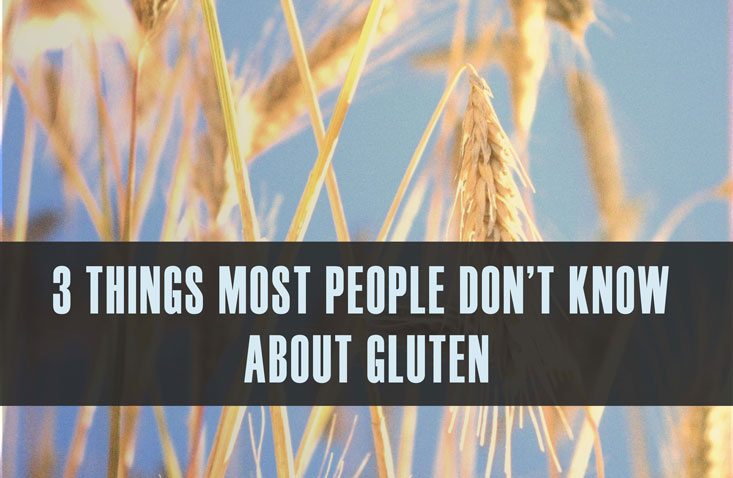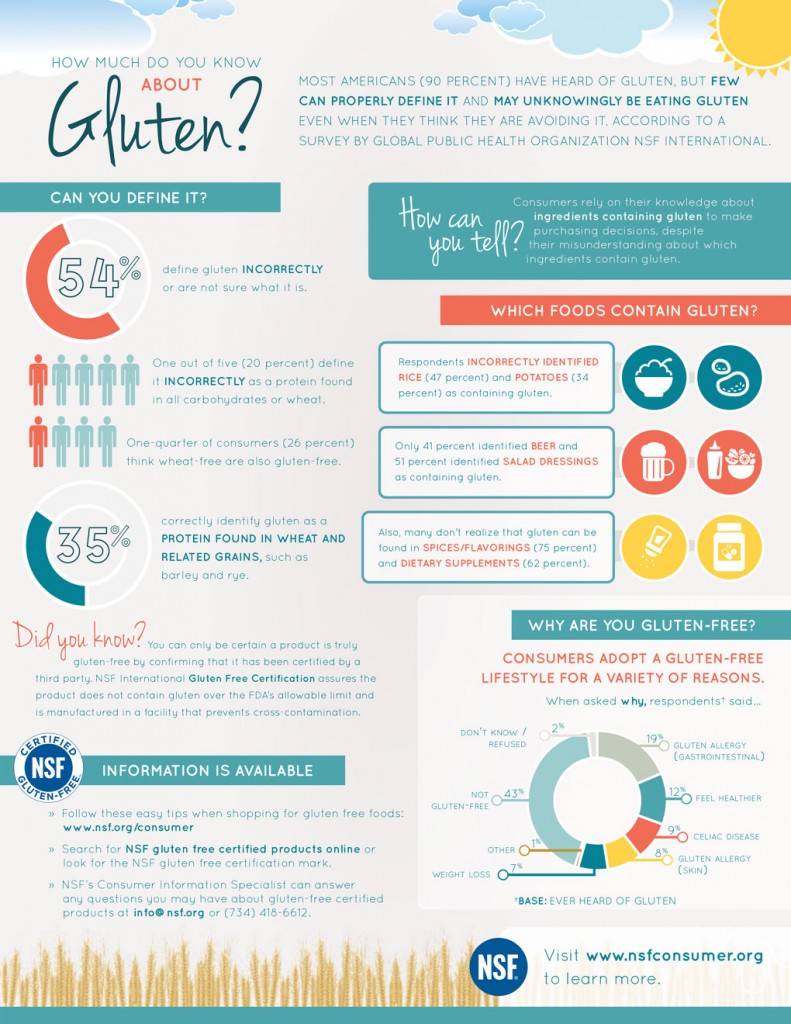The ever-increasing availability of gluten free products in grocery stores is a very interesting phenomenon. It’s even more interesting when 90% of Americans have heard of gluten while only 35% of them really know what it is, as a result of a 2015 survey by NSF International. (1) About half of those who have heard of gluten incorrectly believe that beer is gluten free, and that rice contains gluten. (1)
Below is an infographic that details the survey.
So…What’s The Deal With Gluten?
Most of gluten’s controversies surround inflammation, autoimmunity, and gut permeability. For those who are not familiar, here is a quick run through.
Gluten is a mixture of proteins in wheat, barley and rye. It contains proteins, including the α-, γ-, ω-gliadins, and low-molecular-weight and high-molecular weight glutenins. These proteins, some more than others, are capable of triggering immune reactions.(2) This is the basis of how ingesting gluten can cause inflammation.
To understand the connection between gluten and autoimmunity, we have to introduce a protein called Zonulin. Zonulin is the ONLY key we know to open up doors on the cell wall of our digestive tract. Usually, these doors are shut to keep bad things (toxins, foreign substances) from entering our blood stream. When these doors are open, we have a situation called leaky gut.(3)When bad things leak into our blood, our immune system attacks. When this happens again and again, our immune system becomes overactive and confused, and sometimes attacks our own tissues, so now we have a situation called autoimmune disease. Infections and gluten are two things that are known to activate Zonulin. (4,5) So there is that.
Really, How Big A Problem Is Gluten?
A 2009 study (6) took 9,133 frozen blood samples that were collected between 1948 and 1954, and compared them to 12,768 recent samples. They found that immune reactions to gluten has dramatically increasd more than 4-fold in the United States. So yes, gluten is a bigger problem today than 50 years ago.
Many people look at this study as part of the evidence that points to a gluten free diet, which I respectfully disagree.
- The study shows that increased immune reaction to gluten is a real problem today.
- The fact that gluten wasn’t a big issue 50 years ago tells me that maybe gluten is not evil. Just saying.
- The fact that we are reacting to gluten more today tells me that changes in industry food processing and increased reactivity of our immune system are more likely to blame.
- Our investigation should focus more on how gluten affects different populations. We should ask why certain individuals are more susceptible to the negative effects of gluten.
Put Gluten Into Perspective
Remember Zonulin and how gluten is one of the few known substances to stimulate the release of zonulin and causes leaky gut? You think the discoverer of zonulin, Dr. Alessio Fasano, would be the biggest advocate of a gluten free diet for everyone. Quite the contrary, the man thought the fad component of gluten-free diet is going out of control and his research had been quoted out of context (you can find his interviews and lectures on youtube). He had to write a book called Gluten Freedom to separate the wheat from the chaff (pun intended:)).
-
Our gut microbiome, not gluten, determines our health
We are influenced by TWO genomes—humane genome and microbiome genome. The number of microbial cells vastly outnumbers our own cells. (7) It is now known that our gut bacteria directly influences and modulates our own immune system. A Gluten free diet does NOT normalize gut microbial imbalance in celiac patients, which are thought to perpetuate their autoimmunity. (8) Instead of asking what’s wrong with gluten, consider what’s wrong with us, or our gut bacteria.
-
Different type of gluten-free diets affect our gut differently
An interesting study (9) in 2015 observes metabolic dysfunction and microbial profile changes in celiac children when switched from an African-style gluten-free diet to an Italian-style gluten free diet. We just started to realize that different gluten free diets actually have different effects on the body. Gluten free alone is not a cure.
-
Gluten-free food ≠ healthier products
Many people simply associate gluten-free with healthier food choices, like organic and non-GMO, without knowing that some commonly consumed packaged GF foods are higher in fat and carbohydrates and lower in protein, iron and folate compared with regular products. (10) Studies consistently show that gluten free products are NOT healthier than those of non-gluten free products, and it is an increasing area of concern. (11,12,13)
To Go Gluten Free Or Not To Go Gluten Free
Every major change in our diet carries with it the possibility of unforeseen risks. (14) Agriculture has fueled the human civilization to become what it is today. I think the majority of us will be ok eating what our ancestors have eaten in the past 10,000 years. Gluten free is not necessary for the general population.
To those who are concerned about the negative effects of gluten, just know that we certainly cannot rid all the toxins in our environments, and human resilience must not be underestimated. Is gluten free diet a fad or a cure? Time will tell.
References:
- http://www.nsf.org/newsroom/nsf-survey-finds-us-consumers-struggle-to-define-identify-gluten
- Koning F. Adverse effects of wheat gluten. Ann Nutr Metab. 2015;67(suppl 2):8-14. [PubMed]
- Lammers KM, Lu R, Brownley J et al. Gliadin induces an increase in intestinal permeability and zonulin release by binding to the chemokine receptor CXCR3. Gastroenterology. 2008 Jul;135(1):194-204. [PubMed]
- Fasano A. Intestinal permeability and its regulation by Zonulin: diagnostic and therapeutic implications. Clin Gastroenterol Hepatol. 2012 Oct; 10(10):1096-1100. [PubMed]
- Drago S, El Asmar R, Di Pierro M et al. Gliadin, zonulin and gut permeability: effects on celiac and non-celiac intestinal mucosa and intestinal cell lines. Scand J Gastroenterol. 2006 Apr;41(4):408-19. [PubMed]
- Rubio-Tapia A, Kyle RA, Kaplan EL et al. Increased prevalence and mortality in undiagnosed celiac disease. Gastroenterology. 2009 Jul;137(1):88-93. [PubMed]
- Mulle JG, Sharp WG, Cubells JF. The gut microbiome: a new frontier in Autism research. Curr Psychiatry Rep. 2013 Feb;15(2):337. [PubMed]
- Sanz Y. Microbiome and gluten. Ann Nutr Metab. 2015;67(suppl 2):28-41. [PubMed]
- Ercolini D, Francavilla R, Vannini L et al. From an imbalance to a new imbalance: Italian-style gluten-free diet alters the salivary microbiota and metabolome of African celiac children. Sci Rep. 2015 Dec 18;5:18571. [PubMed]
- Kulai T, Rashid M. Assessment of nutritional adequacy of packaged gluten-free food products. Can J Diet Pract Res. 2014 Dec;75(4):186-90. [PubMed]
- Wu JH, Neal B, Trevena H et al. Are gluten-free foods healthier than non-gluten free foods? An evaluation of supermarket products in Australia. Br J Nutr. 2015 Aug 14;114(3):448-54. [PubMed]
- Missbach B, Schwingshackl L, Billmann A et al. Gluten-free food database: the nutriontla quality and cost of packaged gluten-free foods. Peer J. 2015 Oct 22;3:e1337. [PubMed]
- Saturni L, Ferretti G, Bacchetti T. The gluten-free diet: safety and nutritional quality. Nutrients. 2010 Jan;2(1):16-34. [PubMed]
- Nash DT, Slutzky AR. Gluten sensitivity: new epidemic or new myth? Proc (Bayl Univ Med Cent). 2014 Oct;27(4):377-378. [PubMed]
About the Author
Dr. Lily Semrow is a Board Certified Chiropractic Neurologist who focuses on Neuro-Structural Correction. She has a B.S. in Nutrition and a doctorate in Chiropractic. She has a passion for serving families, and helping people who could not get better through traditional and alternative means.


